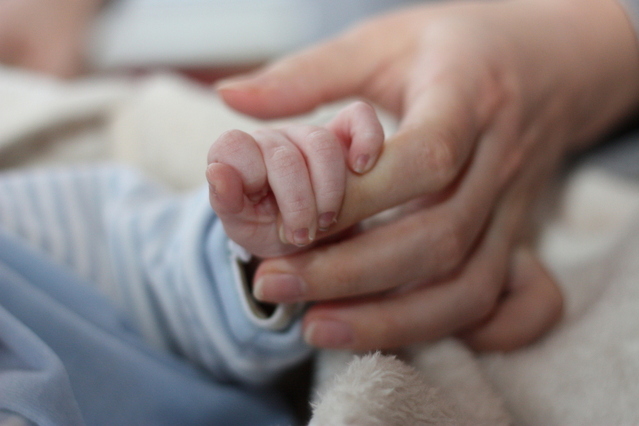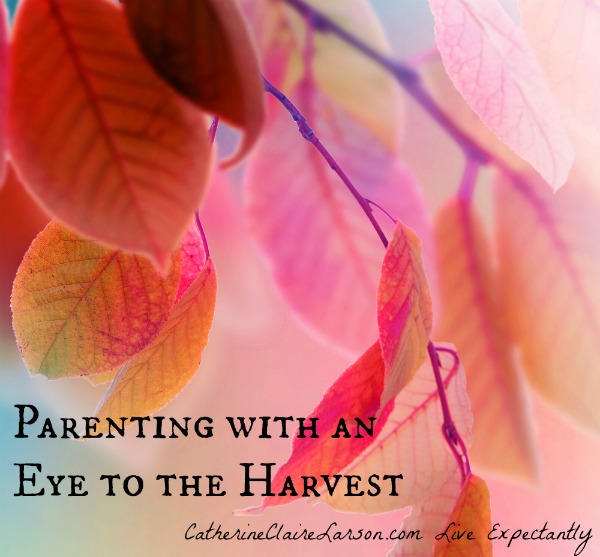When All I Have to Give Seems So Small, Part I

Early motherhood is an especially intense season of life. Often professional degrees seem to sit idle as we wipe bottoms and noses, count piggy toes, and muddle through sleep-deprived nights on caffeine and a prayer. And yet there’s so often both internal and external pressure that we should do more, give more, and be more.
But deep down, we know there’s not any more of us to give. We know that this is a season of life where our worlds seem shrunken in, and supporting those in our immediate care is not only our high and holy calling, but often all we can do.
As I was meditating on this, God brought to mind several historic examples of people who gave what little they had and how God multiplied it. These examples remind me how Jesus takes the two fish and the five loaves and feeds the multitudes, and how he will take my “all I have to give” and bless it.
When all I have to give is love for the man God gave me:
Katharina Von Bora was the infamous nun who ran away (or rolled away rather in a barrel of herring) and ended up marrying reformer Martin Luther. The former celibate priest wrote, “There is no bond on earth so sweet, nor any separation so bitter, as that which occurs in a good marriage.” Katie desired to free Luther up so that he could serve as God had called him. So in addition to caring for their 6 children and the 4 orphans who came under their roof, she did all she could to manage the affairs of the house. Luther called her “the morning star of Wittenberg” since she rose before dawn to care for the livestock, garden, and children.
But while running the affairs of the house was certainly a heavy load, Katie also stood by her man in another important way, as a strong spiritual ally. When Luther was facing a particularly deep period of depression, she greeted him at the door one evening wearing the traditional all-black of mourning attire. Confused, Luther asked her, “Who is dead?” She responded, “Don’t you know, God is dead?” Like the prophets of old, Katie paraded a visual message before her husband and showed him the practical atheism at the root of his current despair. Luther got the message loud and clear and saw the ludicrousness of his own attitude. Katie had been a good theologian to the theologian.
God took Katie’s desire to serve her husband and home—the “all she had to give”—and multiplied many times over. Only in eternity will we know the true weight of her impact on Luther and the generations which followed.
When all I have to give is love for the children under my care:
While Charles and John Wesley are in the Who’s Who of modern Christianity, many of us have never even heard of Susanna Wesley, their mother. And yet, it was this woman who had such a profound influence shaping the great revivalist preachers and fathers of modern Methodism.
Home-life wasn’t easy for Susanna. After a minor dispute, her husband disappeared for over a year. And his poor management of the family’s finances also landed him in jail twice. During one of these separations, Susanna wrote to her husband about how God had led her to spend individual time loving their children well. She writes:
“I am a woman, but I am also the mistress of a large family. And though the superior charge of the souls contained in it lies upon you, yet in your long absence I cannot but look upon every soul you leave under my charge as a talent committed to me under a trust. I am not a man nor a minister, and yet as a mother … I felt I ought to do more than I had yet done. I resolved to begin with my own children; in which I observe the following method: I take such a proportion of time as I can spare every night to discourse with each child apart. On Monday I talk with Molly, on Tuesday with Hetty, Wednesday with Nancy, Thursday with Jacky, Friday with Patty, Saturday with Charles.”
It was during these special one-on-one times where Susanna instilled the spiritual habit of self-examination, by asking thoughtful questions regarding the state of each child’s soul, and his or her goals and progress toward them. Susanna went to great lengths to shepherd the hearts of the children God had given her and the repercussions of her priorities are still felt today.
When all I have to give are my prayers:
Before St. Augustine ever wrote The Confessions or City of God, his loving mother, Monica, prayed, fasted and wept bitterly over the waywardness of her son. In a well-known episode, a priest reportedly comforted the distraught mother with the words, “the child of such tears shall never perish.” After nearly two decades of her faithfulness, St. Augustine turned to God.
Encouraged by this post? Read: When All I Have to Give Seems So Small, Part II. In it, we look at how God used friendship and a mom’s need to put bread on the table to change the world. And if you haven’t yet subscribed to get these posts to your inbox, you can right here.






